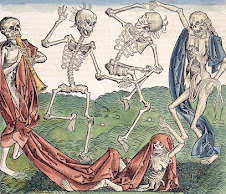Thursday, April 3, 2008
Love in the Lais and Knight of the Cart
I found it interesting how both authors regarded love as a completely absurd notion. That's not to say that these authors did not regard love as a powerful force, however, these authors certainly seemed inable to see the 'logic' or 'sense' in love.
In 'Knight of the Cart', Lancelot is described as donig absurd things, such as trying to kill himself (twice!) when he finds out that his love with Guinevere may not be realized. When dueling the 'evil M-something' he even positions himself so that he can stare at Guinevere while fighting at the expense of his combat positioning. However, by contrast, we see Guinevere's marriage to the king as totally acceptable and reasonable. Although they may not love each other, from everything we can see, their marriage is practical.
In the Lais, Marie outright states a similar point when she says "
Long life is not the recompense
For love without measure or sense;
But love itself is the measure of
Love; reason can't be kept in love."
In other words, love leaves to a short life (death), and reason must be kept out of love. Although love is romanticized in these texts, it is most definately described as an illogical and impractical feeling that should be left out of relationships.
In 'Knight of the Cart', Lancelot is described as donig absurd things, such as trying to kill himself (twice!) when he finds out that his love with Guinevere may not be realized. When dueling the 'evil M-something' he even positions himself so that he can stare at Guinevere while fighting at the expense of his combat positioning. However, by contrast, we see Guinevere's marriage to the king as totally acceptable and reasonable. Although they may not love each other, from everything we can see, their marriage is practical.
In the Lais, Marie outright states a similar point when she says "
Long life is not the recompense
For love without measure or sense;
But love itself is the measure of
Love; reason can't be kept in love."
In other words, love leaves to a short life (death), and reason must be kept out of love. Although love is romanticized in these texts, it is most definately described as an illogical and impractical feeling that should be left out of relationships.
Subscribe to:
Post Comments (Atom)

No comments:
Post a Comment